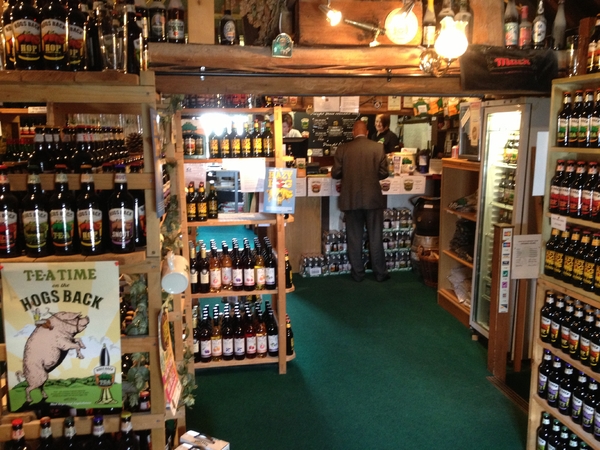They're brewing high on the hog in Surrey
Added: Sunday, August 11th 2013
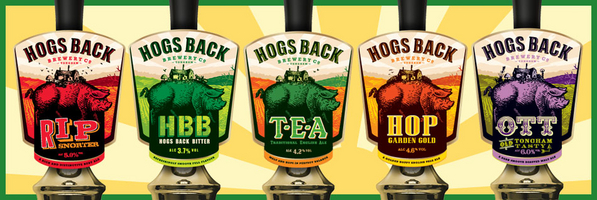
Rupert Thompson points to a large hole in the roof of his brewery. “That’s where we dropped in a new 160-barrel fermenter,” he says. The offending vessel (below right, seen being dropped through the roof) stands proud from floor to ceiling, visible proof of the expansion underway at Hogs Back. Outside, parts of the buildings are draped in tarpaulin and scaffolding as Hogs Back prepares to install four additional fermenters in September.
Hogs Back is enjoying a sales growth of 30 per cent a year and output in 2013 is on target to hit 10,000 barrels. When the new fermenters and conditioning tanks are in place, the brewery will have the potential to grow to 23,000 barrels a year, making it a fully-fledged regional brewery rather than a micro.
Hogs Back celebrated its 21st birthday this year. It’s based on a farm at Tongham, near Guildford in Surrey. The site, rather alarmingly, is called Manor Farm, the same name used by George Orwell in Animal Farm. But the pigs aren’t planning a revolution and the hog in the brewery’s name comes from the famous ridge over the Surrey Downs that runs between Farnham and Guildford.

It’s still farming country. Across the road from the brewery, a large field is lush with golden grain, just a few days from being harvested. And close by a hop farm delivers a plentiful supply of Fuggles.
The brewery was founded by Tony Stanton-Precious and Martin Zilwood-Hunt, who brewed just 10 barrels a week at the start. They built sales substantially over the years, based largely on the success of their leading beer T.E.A., which stands for Traditional English Ale but cleverly plays on the British love of a cuppa.
When Tony decided it was time to put his feet up, he sold his share of the business to Rupert Thompson, who has vigorously developed the business over the past 11 months. He is chairman of the company and brings a wealth of experience of the industry with him.
He worked for Bass and Morland before creating Refresh UK, which bought the Brakspear brewery in Henley-on-Thames when it was put up for sale. Refresh merged it with the Wychwood brewery in Witney but kept the original Henley brewing equipment, including the famous “double drop” fermenting vessels.
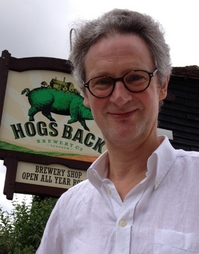
When Marston’s bought the Witney business, Rupert (pictured left) recharged his batteries and then took over at Hogs Back. Martin Zilwood-Hunt is a still a director and is a familiar figure at beer festivals, driving the Hogs Back motor bike complete with a sidecar shaped like a wooden beer cask (below right).
The brewery is buzzing. While the multi-award-winning T.E.A. accounts for 70 per cent of production, new products are being added at a rate of knots. Hazy Hog is a cloudy cider that was launched this year to great acclaim. It’s brewed for Hogs Back by Thatchers and is based on the Normandy method, unfiltered and with fresh young cider added to the mature, finished version.
Hogs Back has had similar success with its first lager, a 4.5% Hogstar “New English Lager”. It’s made with five hops – Centennial, Fuggles, Hersbrucker, Perle and Tettnang – and has a six to seven weeks production cycle, including a month of cold conditioning.
It’s been such a success that the brewery has run out and is desperately waiting for a new batch to be ready. At present, the lager is brewed for them but it will move in-house when an 80-barrel dual purpose vessel is installed that will act as both fermenter and conditioning tank.
Rupert Thompson believes there’s a big potential for properly-brewed lager in Britain and sales will grow. His version is excellent, with a toasted malt aroma and a fine balance of juicy malt and tart, bitter hops on palate and finish.
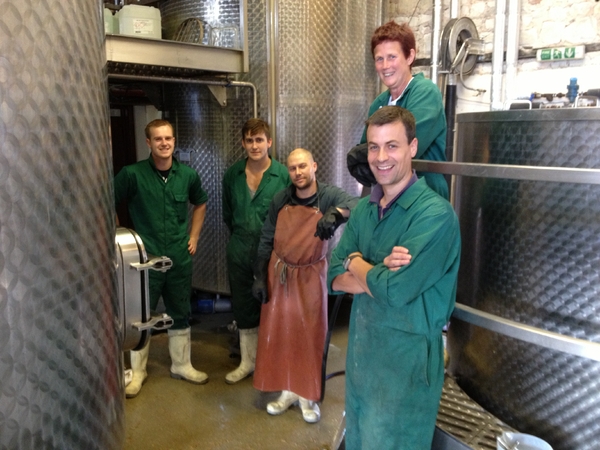
The brewing team has been expanded to help keep pace with the demand for beer. Mo Zeiher is First Brewer and has been with Hogs Back since its inception. Her length of service is measured by the fact that she brewed a beer called Brewster’s Bundle when her daughter was born and that daughter, Charley, now works at Hogs Back.
Mo’s been joined by a new Head Brewer, Miles Chesterman, who has come from Molson-Coors in Burton-on-Trent and brings a fresh perspective on production but isn’t planning to recreate Carling in rural Surrey. The brewing team is pcitured below, with Miles Chesterman and Mo Zeiher in the foreground.
Mo’s philosophy, passionately supported by Rupert Thompson, is that they brew uncomplicated, traditionally English beers with a solid malt base and hop bitterness coming mainly – but not exclusively – from Fuggles. Over the years, the brewery has used both Maris Otter and Pearl malting barleys but has settled on the newish spring variety, Tipple.
All the beers have been boosted by a major rebranding exercise, with new pump clips and labels that emphasise their devotion to the hog. The standard 3.7% HBB or Hogs Back Bitter has a rich biscuit malt character but is not lacking in hop notes from Bramling Cross and Goldings as well as Fuggles. T.E.A., 4.2%, is massively fruity – sultana and plums – with a touch of butterscotch from crystal malt. It’s an all-Fuggles beer, with a spicy hop note balancing the malt and fruit. The beer is on sale in Sainsbury’s and Tesco stores and is taken in draught form by Enterprise, Punch and Spirit pubs as well as the free trade.
Hop Garden Gold, 4.6%, was developed for the Royal Horticultural Society’s main gardens at Wisley in Surrey and is on sale there. But it has proved such a success that it’s now widely available in bottle and cask. It’s brewed with locally-grown Fuggles and has a delightful floral fruity aroma and palate with rich banana and pineapple notes.
Other regular or seasonal beers include Rip Snorter, 5%, packed with crystal and chocolate malt character, a 3.9% Summer Ale with a good peppery Goldings aroma, OTT, 6%, a black old ale with a chewy roasted malt note, and the amazing 9% AoT.
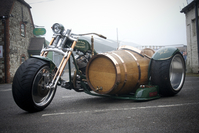
Mo Zeiher took me into a side room and poured small samples of AoT from a wooden cask. The name stands, the brewery says, for Aromas over Tongham, but is more widely believed to come from a vulgar old London saying that signifies a drinker is incapable of standing upright.
This version of AoT was 11 months old. It’s brewed with pale, crystal and chocolate malts and is hopped with Bramling Cross and Goldings. Rupert describes it as “dessert beer” and in my opinion it would make the ideal companion for Stilton and other strong cheeses.
It’s strikingly vinous with ripe grapes, raisin and sultana fruit, a hint of fresh tobacco and peppery hops on the nose. In the mouth there’s rich honey malt, a teasing hint of chocolate, rich fruit and peppery hops, ending with a long, complex, bittersweet finish that finally becomes dry.
Hogs Back plans to make the beer available in bottle conditioned form. Before Rupert Thompson arrived, the brewery phased out bottle conditioning as a result of supermarket complaints about “cloudy beer”. But Hogs Back will now carefully review its policy and may produce other, stronger beers in bottle-conditioned form.
Rupert, with his depth of experience of brewers big and small, is bullish about the future. Hogs Back has a solid base of free trade and pub co sales,with bottled beer in major supermarkets. The bulk of bottled beer sales come from the brewery’s spacious and impressive shop that stocks brands from Belgium, Germany and the U.S. as well as its own brands, which account for 90 per cent of business. Rupert plans to add a visitor centre, with a bar and kitchen, to draw in more customers.
“There’s a shift from global brands to regional brands,” he says. “All the growth is coming from the micros as people shift to local brands. The big players may control the market but consumers are looking for choice. If we had a genuine free market, the growth of the micros would be even faster.”
He believes the global brewers will look for growth in the emerging “bric” nations of Brazil, Russia, India and China. That will give more scope and opportunity to regional and small brewers in Britain but Rupert sees some problems ahead for the independent sector.
“The number of breweries is not sustainable,” he says. “Many micros are happy brew 3,000 barrels a year but their problem will be when a second brewery opens up down the road. There are only so many free houses available and consolidation is inevitable.
“If the industry can’t grow the overall size of the beer market, then consolidation is inevitable. And if breweries merge, their combined production could mean they wouldn’t qualify for Progressive Beer Duty, which could mean a loss of £180,000 a year.”
A sobering thought. But there are no furrowed brows at Hogs Back and no thought of mergers. The only worry at the moment is that another hole may have to be knocked in the roof when the 80-barrel lager tank arrives.
*Brewery Shop pictured below. Hogs Back Brewery, Manor Farm, The Street, Tongham, Farnham, Surrey GU10 1DE; 01252 783000; www.hogsback.co.uk.
